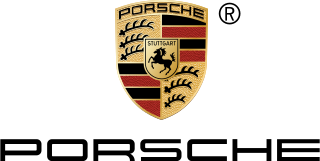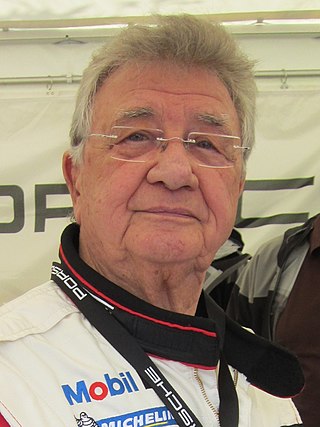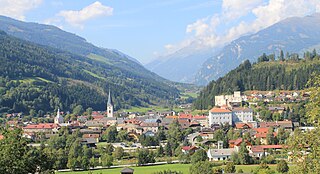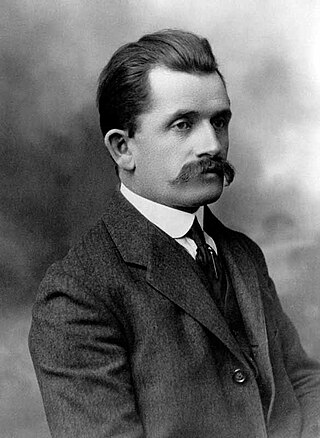
Dr. Ing. h.c. F. Porsche AG, usually shortened to Porsche, is a German automobile manufacturer specializing in high-performance sports cars, SUVs and sedans, headquartered in Stuttgart, Baden-Württemberg, Germany. The company is owned by Volkswagen AG, a controlling stake of which is owned by Porsche Automobil Holding SE. Porsche's current lineup includes the 718, 911, Panamera, Macan, Cayenne and Taycan.

The Porsche 356 is a sports car that was first produced by Austrian company Porsche Konstruktionen GesmbH (1948–1949), and then by German company Dr. Ing. h. c. F. Porsche GmbH (1950–1965). It was Porsche's first production automobile. Earlier cars designed by the Austrian company include Cisitalia Grand Prix race car, the Volkswagen Beetle, and Auto Union Grand Prix cars.

Volkswagen AG, known internationally as the Volkswagen Group, is a German multinational automotive manufacturer headquartered in Wolfsburg, Lower Saxony, Germany. The company designs, manufactures, and distributes passenger and commercial vehicles, motorcycles, engines and turbomachinery, as well as offers related services, including financing, leasing, and fleet management. In 2016, it was the world's largest automaker by sales, and keeping this title in 2017, 2018, and 2019, selling 10.9 million vehicles. It has maintained the largest market share in Europe for over two decades. It ranked seventh in the 2020 Fortune Global 500 list of the world's largest companies.

Ferdinand Porsche was an Austro-Bohemian automotive engineer and founder of the Porsche AG. He is best known for creating the first gasoline–electric hybrid vehicle (Lohner–Porsche), the Volkswagen Beetle, the Auto Union racing cars, the Mercedes-Benz SS/SSK, and several other important developments and Porsche automobiles.

Ferdinand Anton Ernst Porsche, mainly known as Ferry Porsche, was an Austrian-German technical automobile designer and automaker-entrepreneur. He operated Porsche AG in Stuttgart, Germany. His father, Ferdinand Porsche Sr. was also a renowned automobile engineer and founder of Volkswagen and Porsche. His nephew, Ferdinand Piëch, was the longtime chairman of Volkswagen Group, and his son, Ferdinand Alexander Porsche, was involved in the design of the 911.

The Porsche 917 is a sports prototype race car developed by German manufacturer Porsche to exploit the regulations regarding the construction of 5-litre sports cars. Powered by a Type 912 flat-12 engine which was progressively enlarged from 4.5 to 5.0 litres, the 917 was introduced in 1969 and initially proved unwieldy on the race track but continuous development improved the handling and it went on to dominate sports-car racing in 1970 and 1971. In 1970 it gave Porsche its first overall win at the 24 Hours of Le Mans, a feat it would repeat in 1971. It would be chiefly responsible for Porsche winning the International Championship for Makes in 1970 and 1971. Porsche went on to develop the 917 for Can-Am racing, culminating in the twin-turbocharged 917/30 which was even more dominant in the role. Porsche drivers would win the Can-Am championship in 1972 and 1973. 917 drivers also won the Interserie championship every year from 1969 to 1975.

Hans Herrmann is a retired Formula One and sports car racing driver from Stuttgart, Germany.

Ferdinand Karl Piëch was an Austrian business magnate, engineer and executive who was the chairman of the executive board (Vorstandsvorsitzender) of Volkswagen Group in 1993–2002 and the chairman of the supervisory board (Aufsichtsratsvorsitzender) of Volkswagen Group in 2002–2015.

Gmünd in Kärnten is a municipality and historic town in the district of Spittal an der Drau, in the Austrian state of Carinthia.

The Porsche 356/1 was the first real car created by Ferdinand "Ferry" Porsche. This prototype car was a two-seater open roadster with a mid-mounted, air-cooled flat-4 engine of 1,131 cc displacement that produced 40 horsepower (30 kW). While the body was an original design, most of the mechanicals were derived from the Volkswagen Beetle which Ferry's father, Ferdinand Porsche, had designed.

The Porsche family is a prominent Austrian–German family of industrialists descending from the Austrian–German automotive pioneer Ferdinand Porsche. Its members control Porsche SE and have a majority voting right over Volkswagen AG, the largest automaker in the world. The Porsche family headquarters are in the Austrian town of Zell am See. The family is the 7th richest family of Germany (2022) with an estimated net worth of 22,5 billion Euros.
Louise Hedwig Anna Wilhelmine Piëch was the daughter of automotive pioneer Ferdinand Porsche. In 1928, she married Anton Piëch, a lawyer from Vienna who from 1941 to 1945 led the KdF-Wagen (Volkswagen) factory in KdF-Stadt.

Porsche Automobil Holding SE, usually shortened to Porsche SE, is a German multinational corporation primarily known as a holding company of Volkswagen Group with investments in the automotive industry. Porsche SE is headquartered in Zuffenhausen, a city district of Stuttgart, Baden-Württemberg and is majority owned by the Austrian-German Porsche-Piëch family. The company was founded in Stuttgart as Dr. Ing. h.c. F. Porsche GmbH in 1931 by Ferdinand Porsche (1875–1951) and his son-in-law Anton Piëch (1894–1952).
Porsche AG is an automobile manufacturer and a subsidiary of Volkswagen AG

The 1970 1000km of Nürburgring was an endurance race held at the Nürburgring Nordschleife, Nürburg, West Germany on May 31, 1970. It was the seventh round of the 1970 World Sportscar Championship season.

The 1970 Austrian 1000km was an endurance race held at the Österreichring, near Zeltweg, Austria on October 11, 1970. It was the tenth and final round of the 1970 World Sportscar Championship season.
Anton Piëch was an Austrian-German lawyer and the son-in-law of Ferdinand Porsche. He headed Volkswagenwerk GmbH between 1941 and 1945, which produced the Volkswagen vehicles (KdF-Wagen) at the factory in Wolfsburg, Germany.

Wolfgang Heinz Porsche is a German-Austrian manager and a member of the Porsche family. He is a shareholder and chairman of the Supervisory Board of Porsche Automobil Holding SE as well as of Porsche AG. He is the youngest son of Ferdinand (Ferry) Porsche and Dorothea Reitz. His oldest brother is Ferdinand (Butzi) Porsche, designer of the Porsche 911.

Hans Dieter Pötsch is an Austrian businessman, the chairman of the executive board of Porsche SE, and chairman of the supervisory board of Volkswagen since 2015, when he succeeded Ferdinand Piëch.

The Porsche 356/2, produced in Gmünd, Austria, was the first iteration of the Porsche 356 sports car. Produced between 1948 and 1951, the Porsche 356/2 was the first series production aluminum bodied sports car of Porsche after the creation of the 356-001 one-off prototype in Gmund Austria. It was built in limited numbers, making it a highly sought-after collector's item today.





















